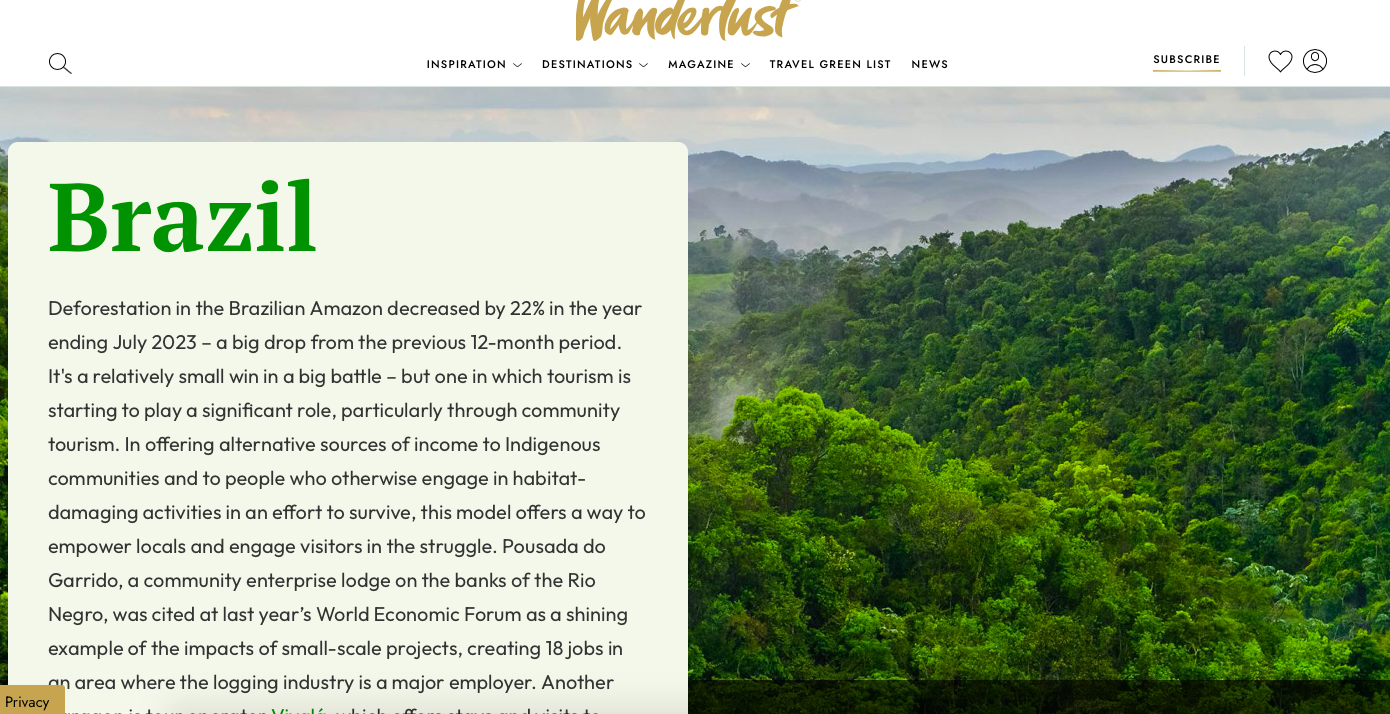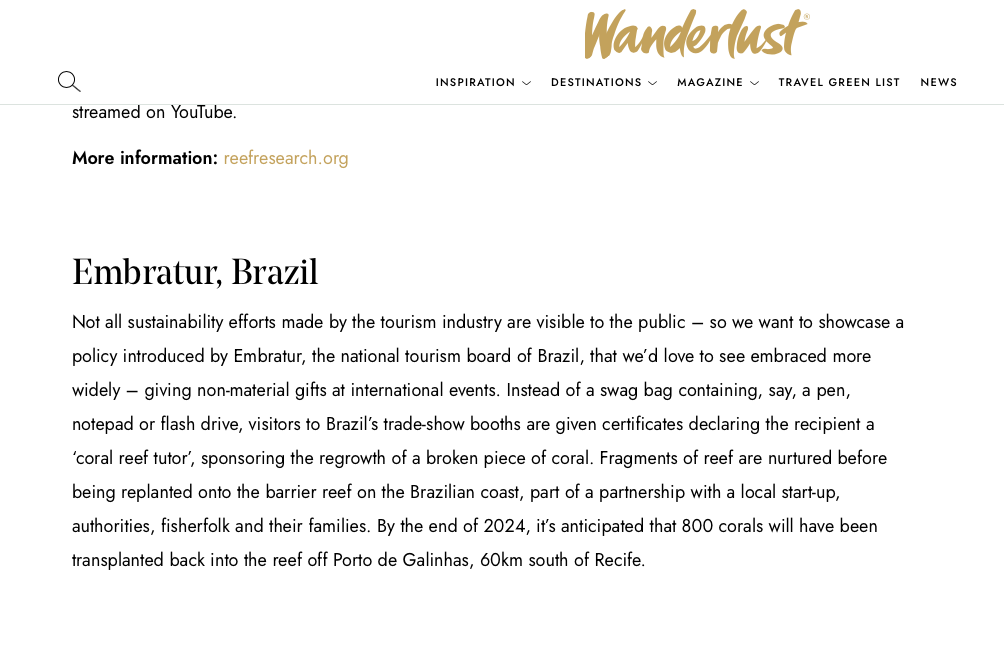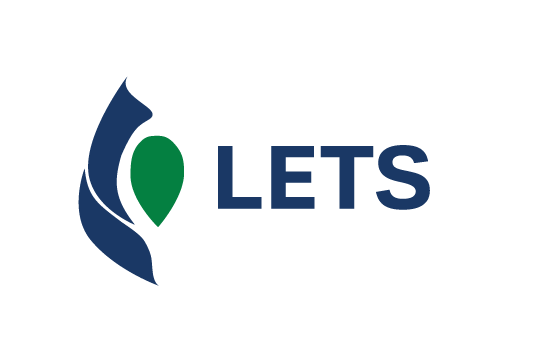In my 18 months of work at the Brazilian Agency for International Tourism Promotion (Embratur), one of the greatest joys I felt was to see Brazil once again stamping the The Travel Green List : for travellers who care - from the respected English publisher Wanderlust.
Brazil was alongside Costa Rica, Colombia, Ecuador and Panama with initiatives that show tourism's commitment to sustainability.
In my day-to-day life, after several interactions and exchanges with relevant international actors, I realized with excitement the global openness that existed for a Brazil committed to its socio-environmental issues and its origins. Yes, I heard this from international publishers considered references in the universe of communication and marketing of tourism.

It was just as or more encouraging to see, in the same edition, the mention of Embratur's work to support coral regeneration, alongside projects in Australia, Polynesia, among others. In our case, Wanderlust said: not all innovation in tourism is seen by tourists. And I wanted our initiative to spread widely throughout the sector.

What we did was replace traditional souvenirs distributed at events trade of tourism for "immaterial" gifts that demonstrated the alliance between tourism and regeneration - a genius idea planted in us by Director Jaqueline Gil in February 2023.
At this point, I revisited the first meeting of the whole team, when Jaqueline called us to think about the new, saying: "I want a Brazil that is trend maker ( trendsetter), and not trend taker (trend follower)" [own translation].
In this case, authorities, operators and other personalities were presented with coral adoption certificates in partnership with the Coral Biofactory in Alagoas. This was an initiative well tied between global trends, tourism promotion, image management, cohesion between the federal and state spheres, strengthening national technology, anchoring in a solid and auditable startup with healthy relationships with the local community. Catafalque action was launched , not by chance, at the ITB Berlin in March 2024 – after all, Germany is a market with high standards in terms of sustainability. In this way, it caused a more than expected repercussion.
The initiative was well received by countries that we have a deep respect for in the theme of image building, such as Chile. We even heard from incredible professionals from other countries a: "how did I not think of this before?!" and "we will copy", with good humor and great recognition in these speeches.
At the same time, we were already exploring new projects where the initiative could expand and diversify: there are many beautiful projects such as Onçafari, Instituto Araras Azul, Instituto Peixe Boi, Projeto Tamar, among other wonderful ones that we have in Brazil. Thus, the stock was ready to grow and multiply. Brazilian destinations and companies wanted to know better how the mechanism was to be able to implement it in their own destinations, some wanted to offer a souvenir like this to their demanding customers who visited Brazil, reaching even the final audience with this message.
The initiative was so innovative, it was highlighted in the Wanderlust publication. It was so interesting, it captured national and international attention.
I felt that we were on the right track – and that, like any path of great change, it takes time, it requires collective effort, and it needs a shared vision of the future.
I returned to the present moment, and it made me happy to think about every small decision we made to strengthen Brazil's position in favor of a more responsible, sustainable and regenerative tourism. And a stimulus for others to walk with us in this direction - after all, it is not a path that is traveled alone.
We don't live only on tourism marketing.
Even in the case of an international promotion agency, it was very clear to me that we do not live only on marketing actions. And by this I mean that we need to take a leap - expressive and qualitative - towards what we already know: the construction of a Branding of country.
And what does this mean?
That we can no longer be isolated in the tourism sector, building only traditional tourism marketing actions - campaigns, materials, websites, social networks, image banks, events. All of this is important, as long as they are sewn into something that we are still far from finding in Brazil: a Strategic Country Brand Management .
This notion challenges us because it does not fit in an authority, an agency, a ministry. She embraces many actors, in all her actions. It is transversal and relates from each action of the representative of the Brazilian Republic, to the Civil House (with Secom), the Ministry of Foreign Affairs (with all our political diplomacy, borders, the performance of its cultural and commercial sectors, etc.), APEX, which fosters the export of products and services "Made in Brazil", to name a few actors. Building cohesive actions requires governance, coordination, and purpose.
To be fair to the past, the origin of the Brazil Brand brought this idea: a country brand, and not a government brand, that was present in a transversal way in Brazilian products. An inter-ministerial seam was made, progress was made. But then: abandoned. Here another lesson is born:
Country brand management is done with continuity, commitment, investment and persistence.
There is no longer the illusion that we will be globally competitive if we do not look at Brazil as a generator of softpower , solutions with global relevance and with the responsibility that falls to us in building the future - as a country that has more than 8 thousand km of coastal zone and is home to immense Amazons (green and blue) and more than 300 native peoples.
As long as we are looking at the best answers only within tourism marketing, we will still be looking at the wrong place.
Thanks
Thank you to LETS for being this generous space for sharing, maturing and exposing ideas. I thank the colleagues who made a kind prior reading of the text.
Thank you to Jaqueline Gil for her trust and inspiration on this exciting journey.


